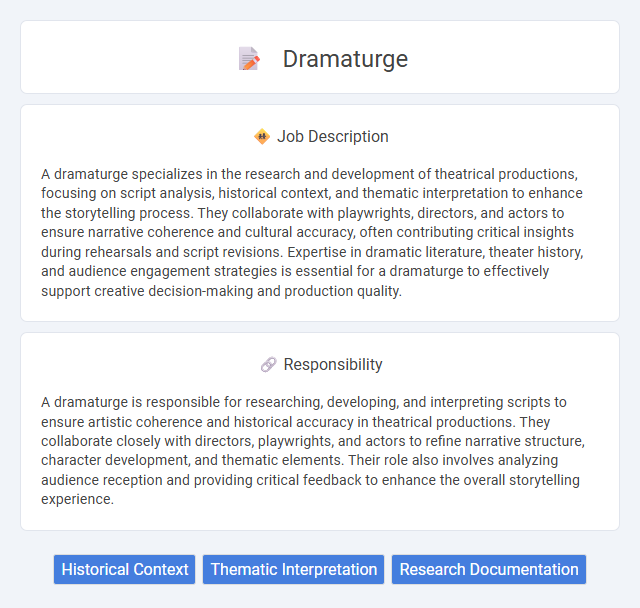
A dramaturge specializes in the research and development of theatrical productions, focusing on script analysis, historical context, and thematic interpretation to enhance the storytelling process. They collaborate with playwrights, directors, and actors to ensure narrative coherence and cultural accuracy, often contributing critical insights during rehearsals and script revisions. Expertise in dramatic literature, theater history, and audience engagement strategies is essential for a dramaturge to effectively support creative decision-making and production quality.
Individuals with strong analytical thinking and a passion for storytelling may find the dramaturge role highly suitable, as it involves dissecting scripts and shaping narratives. Those who thrive under pressure and can collaborate effectively with directors and writers are likely to succeed in this creative, detail-oriented environment. People lacking patience for meticulous research or who prefer solitary work might experience difficulties adapting to the interactive and demanding nature of this profession.
Qualification
A dramaturge typically holds a degree in theatre studies, literature, or dramaturgy, with strong skills in critical analysis, research, and script development. Proficiency in multiple languages and a deep understanding of theatrical history and cultural contexts enhance their ability to collaborate effectively with playwrights and directors. Experience in script editing, audience engagement strategies, and interdisciplinary communication is essential for advancing in this specialized field.
Responsibility
A dramaturge is responsible for researching, developing, and interpreting scripts to ensure artistic coherence and historical accuracy in theatrical productions. They collaborate closely with directors, playwrights, and actors to refine narrative structure, character development, and thematic elements. Their role also involves analyzing audience reception and providing critical feedback to enhance the overall storytelling experience.
Benefit
A dramaturge likely enhances the creative process by providing critical analysis and contextual research, improving the overall quality and coherence of a production. They probably contribute to more informed decision-making, which can lead to stronger storytelling and audience engagement. Their involvement tends to increase the likelihood of a production's artistic and commercial success.
Challenge
A dramaturge likely faces the challenge of interpreting complex scripts and ensuring they resonate with diverse audiences, requiring deep literary knowledge and cultural sensitivity. Navigating collaboration among directors, playwrights, and actors may present difficulties in aligning creative visions while maintaining the integrity of the text. The role probably demands continual adaptation to evolving theatrical trends and audience expectations, posing ongoing professional challenges.
Career Advancement
Mastering dramaturgy skills, such as script analysis, research, and collaboration with directors, significantly enhances career advancement opportunities in theater production. Gaining experience through assistant or associate dramaturge roles leads to positions as lead dramaturge or literary manager, expanding influence across larger productions or theaters. Continuous professional development and networking within the performing arts community further accelerate progression to higher-level creative and managerial positions.
Key Terms
Historical Context
The role of a dramaturge originated in 18th-century German theater, where they provided critical analysis, historical research, and context to support playwrights and directors. Historically, dramaturges have been essential in shaping the narrative structure and ensuring the cultural and temporal accuracy of theatrical productions. Their expertise bridges the gap between text and performance, enhancing the audience's understanding through scholarly interpretation.
Thematic Interpretation
A dramaturge specializes in thematic interpretation by analyzing and contextualizing the underlying messages and motifs within a play or script, ensuring coherence between the narrative and production elements. This role involves collaborating with directors and playwrights to deepen the audience's understanding of central themes, often through research on historical, cultural, and social contexts. By weaving thematic insights into rehearsals and discussions, dramaturges enhance the emotional and intellectual impact of the performance.
Research Documentation
Dramaturges specialize in extensive research documentation to provide historical context, thematic analysis, and cultural insights essential for production development. Their work involves compiling detailed reports on scripts, authors, and relevant socio-political backgrounds to inform directors, actors, and designers. Thorough research documentation by dramaturges ensures authenticity and depth in theatrical storytelling, enhancing audience engagement and critical interpretation.
 kuljobs.com
kuljobs.com